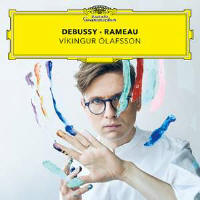Texte paru dans: / Appeared in: |
|
|
Appréciation d'ensemble / Overall evaluation :
|
|
|
Reviewer: Christopher
Dingle
He’s done it again. Víkingur
Ólafsson’s Bach album was justly showered in plaudits (not least Recording of
the Year at the 2019 BBC Music Magazine Awards) for its exceptional pianism
allied to engaging, thought-provoking programming. Now he juxtaposes the two
titans of French keyboard music, Rameau and Debussy, in a new recording packed
full of delights. Debussy’s music may be the more familiar on piano, possibly in
general, but it is clear from the outset that this is no lazy selection of
favourites, the disc opening with the ‘Prelude’ to La damoiselle élue in
the composer’s own rarely heard transcription. In Ólafsson’s hands the segue
into Rameau’s Le rappel des oiseaux is entirely natural, obvious even, the
chattering textures dispatched with breathtaking precision. As noted in his absorbing booklet essay, the album reflects Ólafsson’s own voyage of discovery with Rameau’s music. While the older pieces by Rameau predominate, placing these Baroque masterpieces within the context of Debussy – who later reimagined the piano – underlines their remarkable modernity and encapsulates the historical interplay at the heart of French music of Debussy’s time. The heart-aching poetry of La Cupis is untethered from any historical period, and the changes in texture Ólafsson draws out of Rameau’s Gigues en rondeau suggest a much later composer, yet his playing never feels self-indulgent or inappropriate. Viewed through the other end of the telescope, the laser-like clarity with which Debussy’s ‘Jardins sous la pluie’ whizzes past gives the impression it could be an extension of the first Rameau sequence, encapsulating the joy exuding from Ólafsson’s dazzling virtuosity. The rapid flurries in ‘The Snow is Dancing’ from Children’s Corner emphasise its toccata-like qualities and the striking lack of sentimentality to ‘Des pas sur la neige’ somehow only makes these footsteps all the more heartfelt.
Colour is also to the fore, as reflected in the album’s striking and tactile artwork. Ólafsson draws numerous extraordinary shades and tones from Rameau’s L’entretien des Muses, while his incredibly precise control of the pedal creates the illusion of several distinct instruments in Les tendres plaintes. The delicate interaction of light and water in Debussy’s Ondine draws remarkable sprays of sound, while the clucking of Rameau’s La Poule would not be out of place in Saint-Saëns’s Carnival of the Animals. ‘The Arts and the Hours’, Ólafsson’s own arrangement of an interlude from the opera Les Boréades, is the exquisite centrepiece of the disc, a searching and sublime slow movement to rival any. There is never any doubt that this is Ólafsson’s vision of Rameau and Debussy, but it is also clearly rooted in love for each and their intertwining opens the eyes and the ears, highlighting especially that, like Bach, Rameau’s music is fertile ground for pianists. Debussy’s ‘Hommage à Rameau’ is a natural conclusion, an old friend seen properly for the first time.
| |
|
|
|
|
|
|
|
Cliquez l'un ou l'autre
bouton pour découvrir bien d'autres critiques de CD |
|




